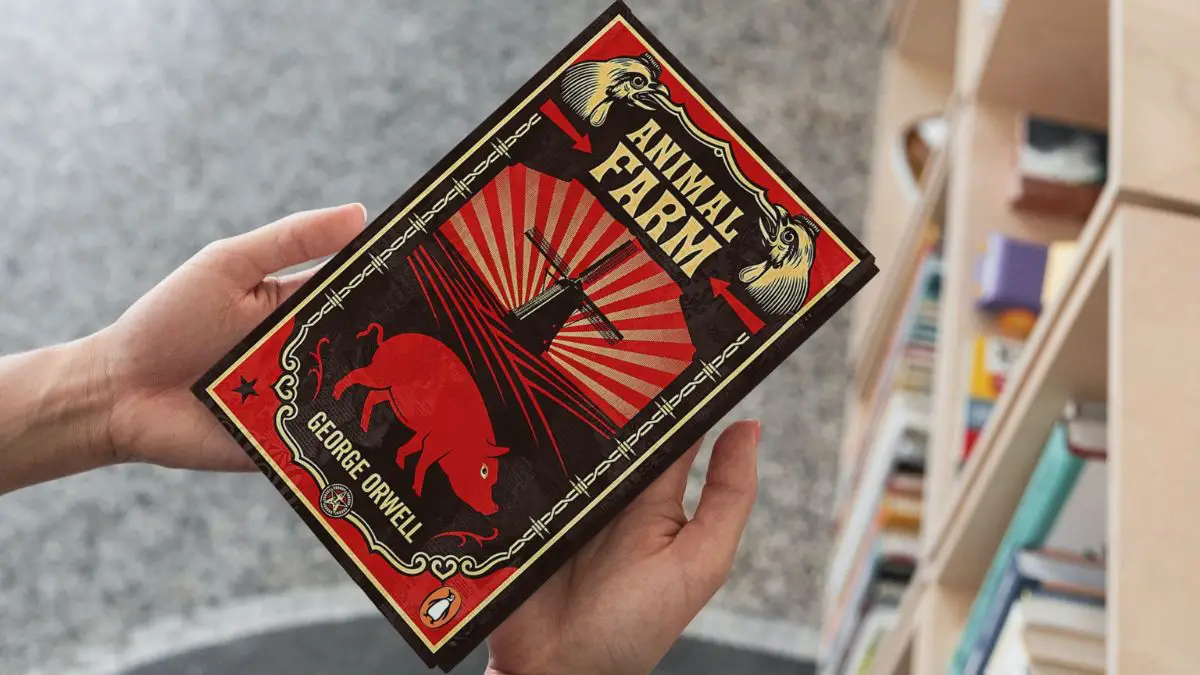Table of Contents
- Introduction
- The World of Animal Farm
- Lesson 1 – Power Corrupts
- Lesson 2 – Propaganda and Manipulation
- Lesson 3 – Equality and Revolution
- Lesson 4 – Language and Rhetoric
- Conclusion
Introduction
The article explores some valuable lessons from Animal Farm, a novella by George Orwell that serves as a powerful allegory for political corruption and totalitarianism.
Published in 1945, George Orwell’s allegorical novella Animal Farm is considered one of the most impactful books of the 20th century. Today, the audiobook version of the title is also available.
Despite its short length, this fable about a group of farm animals who rebel against their human owner and end up oppressed by their leaders has resonated with generations of readers. Even today, Animal Farm‘s lessons remain relevant in examining human nature, politics, and society.
The popularity and endurance of Animal Farm stem not just from its creative storytelling but also from the more profound truths it conveys. Orwell expertly uses the framework of an animal fable to hold up a mirror to humanity’s weaknesses—our susceptibility to propaganda, willingness to follow unjust leaders, and inability to sustain equality. While on the surface, it is about animals, the story is a powerful metaphor for real-world dictatorships and failed revolutions.
This write-up will explore key lessons from Animal Farm that can enrich our understanding of the world and human psychology. By analyzing the thought-provoking events and characters in the novel, we can reflect on how to be more discerning citizens and compassionate individuals. The lessons from Orwell’s short but impactful book remain relevant for anyone seeking to make sense of power, politics, and society.
The World of Animal Farm
Animal Farm tells the story of a group of farm animals who revolt against their human owner to create an egalitarian utopia. The setting is Manor Farm, located somewhere in the English countryside. The animals are anthropomorphized, representing different segments of Russian society in the early 20th century. Some of the main characters include:
- Old Major – An old boar who inspires the rebellion with his vision of an animal utopia called Animalism. He represents Karl Marx.
- Napoleon – A fierce-looking Berkshire boar who becomes the farm leader after the rebellion. He represents Joseph Stalin.
- Snowball – A vivacious pig who challenges Napoleon to control the farm. He represents Leon Trotsky.
- Squealer – A clever pig who becomes Napoleon’s propagandist. He twists language to justify the pigs’ monopolization of power. He represents the Soviet media.
As the story unfolds, the animals successfully expel Mr. Jones, the negligent owner of Manor Farm, to create a just and equitable society. But things slowly go awry as the pigs manipulate the other animals and consolidate their power. Through this allegorical tale, Orwell explores themes like:
- The corruption of socialist ideals
- The dangers of totalitarianism and dictatorship
- The use of rhetoric and propaganda to control the populace
- The ease with which the working class can be exploited
Ultimately, the pigs adopt many of the same exploitative policies as the humans they once rebelled against. Orwell skillfully uses the setting and characters of Animal Farm to critique the Soviet Union and warn readers about revolutions’ tendency to replace one tyranny with another. The novella’s enduring popularity stems from the universal nature of its message about power and corruption.
Lesson 1 – Power Corrupts
George Orwell’s classic novella Animal Farm offers a profound lesson on how power can corrupt even the most well-intentioned individuals and groups.
As the animals stage a revolution to take over the farm from their human oppressors, they aim to create an egalitarian utopia based on the Seven Commandments of Animalism, including the mandate “All animals are equal.” However, the pigs Napoleon and Snowball, who lead the new Animal Farm government, quickly betray this ideal.
The Rise of Napoleon’s Tyranny
Initially, the intelligent pigs Snowball and Napoleon work together to lead the farm after the rebellion. But over time, Napoleon drives Snowball off the farm and consolidates his power, crowning himself leader. He secretly changes the Seven Commandments to benefit the pigs over the other animals, adding, “But some animals are more equal than others.”
Napoleon used violent tactics to eliminate rivals and dissenters. Under his totalitarian rule, the working animals suffer while the pigs live in luxury, contrary to the original spirit of Animal Farm.
The Pitfalls of Unchecked Power
Napoleon’s tyranny highlights the dangers of concentrated power without checks and balances. As Orwell wrote, “Power corrupts, and absolute power corrupts absolutely.” When leaders hold unchecked power, it often leads to abuses and oppression, even if they start with good intentions.
Napoleon’s unquestioned authority allows him to rewrite rules and history to justify his actions. The animals cannot stop him, lacking the power to organize effective resistance. Orwell’s message is that power must have limits and proper oversight to prevent corruption.
Lessons for Society
Animal Farm warns about how self-serving elites can hijack revolutionary movements. While seeking to overthrow their oppressors, the animals inadvertently empower a new tyrant in Napoleon. Orwell suggests that the struggle for equality can be undermined from within without constant vigilance.
Societies must establish safeguards like separation of powers, free press, and public oversight to prevent authoritarianism from taking root, no matter how well-intentioned its genesis. Power’s corrupting nature is a timeless lesson we must heed to build a just world.
Lesson 2 – Propaganda and Manipulation
One of the most powerful elements of Animal Farm is George Orwell’s examination of propaganda and manipulation. The pigs, especially Squealer and Napoleon, are masters of controlling the narrative on the farm and brainwashing the other animals into blindly following their agenda.
Twisting Language and Meaning
The pigs repeatedly change the meaning of words and phrases to justify their actions. For example, after the pigs move into the farmhouse, an act which goes against one of the original Seven Commandments, Squealer explains that there was a rule stating, “No animal shall sleep in a bed with sheets.”
By subtly twisting the language, the pigs manipulate the animals into doubting their memories and accepting the pigs’ revisionist narrative.
Propaganda and Misinformation
The pigs also constantly bombard the animals with propaganda, drilling catchy slogans like “Four legs good, two legs bad” into their heads. They spread misinformation and fake news, using the sheep to chant party-friendly phrases to drown out any doubts or dissent. This creates an environment where the pigs can completely control how the animals perceive reality on the farm.
Importance of Critical Thinking
The ease with which the pigs can manipulate the animals demonstrates the danger of blind obedience. Orwell shows the importance of critical thinking, skepticism, and not taking anything at face value. As we see in real life, those in power often use propaganda and manipulation to further their interests, making it essential that citizens actively question authority and seek the truth.
Lesson 3 – Equality and Revolution
One of the most critical themes in Animal Farm is the idea of equality and how it can be distorted. When the animals first rebel against the humans, they are united by the dream of creating a just society where all animals are equal. The Seven Commandments of Animalism clearly state that “All animals are equal.” However, as the pigs gain more power, the core principle of equality starts to erode.
At first, the distinction between the pigs and other animals seems legitimate – the pigs claim they need more food and rest to function as the brains of the farm. But slowly, the pigs begin to take advantage of their role. They move into the farmhouse, sleep in beds, drink alcohol, and engage in trade with humans – all things initially forbidden by the Commandments. The hypocrisy of “All animals are equal, but some animals are more equal than others” allows the pigs to justify their privileged status.
Orwell shows how easily high ideals can be corrupted. The animals’ revolution begins with optimism about creating an equal society but dissolves into a totalitarian regime ruled by a tyrant. This highlights the challenges of maintaining true equality, even in well-meaning movements. Without constant vigilance, power imbalances can emerge, and the principles of equality can be abandoned.
Animal Farm also demonstrates how revolutions contain inherent risks. The animals overthrow an unjust system, but the power vacuum allows the cunning pigs to seize control. Well-intentioned revolts can be hijacked by those seeking power for personal gain. This is a cautionary tale about the complexities of revolution and the difficulty of transitioning to an indeed just system.
In today’s world, we continue to strive for equality across societies. Animal Farm reminds us that we must be wary of how those in power can twist ideas to suit their interests. Maintaining a truly equitable world requires constant effort and a willingness to challenge unjust hierarchies whenever they emerge.
Lesson 4 – Language and Rhetoric
Language plays a pivotal role in Animal Farm, serving as a tool of control and manipulation. As the pigs gain power, they distort language to suit their agenda. When the animals take over the farm, they establish the Seven Commandments, including “All animals are equal.”
This noble principle is gradually undermined as the pigs revise the commandments to justify their privileged status. The maxim “All animals are equal, but some animals are more equal than others” becomes a cynical justification for inequality.
The pigs also twist language to manipulate the other animals. Squealer, the propagandist pig, euphemistically refers to the slaughter of dissenters as a “readjustment” or animals “dying in peace.” Through these distortions, the pigs mask the ugly reality of their tyranny. Orwell shows how language can obscure facts and brainwash the public.

The pigs further consolidate power by simplifying language into short, forceful slogans like “Four legs good, two legs bad.” This simplistic rhetoric stops the animals from thinking critically. The novel warns us of the dangers of slick political rhetoric. Language becomes “an instrument for concealing or preventing thought without clear communication and commitment to truth.”
Ultimately, Animal Farm cautions us to be wary of words that conceal grim realities. We must scrutinize language used by those in power rather than accepting it at face value. Clear, honest communication is vital for a just society. Orwell’s brilliant use of rhetoric reveals how language can empower, enlighten, and deceive.
Conclusion
As we reflect on the key lessons from Animal Farm, it’s striking how relevant many of them remain in society today. Though Orwell was commenting on the corruption of socialist ideals in the Soviet Union, the story has universal themes that continue to resonate.
The Allure and Dangers of Power
Perhaps the most timeless lesson is how power corrupts. Even the best-intentioned among us can become intoxicated and abusive when given unchecked authority. We must create systems to balance and limit power and be vigilant against demagogues exploiting our trust.
Propaganda Persists
The pigs manipulated the animals through propaganda and rhetorical tricks, twisting language to suit their aims. Similarly, we now face tidal waves of misinformation and demagoguery on social media. Thinking critically, checking sources, and calling out lies has never been more critical.
Revolutions Are Fragile
The animals’ revolution began idealistically and then collapsed. Without constant vigilance, the values that sparked revolutionary fervor can be quietly eroded from within. We must be ever-watchful guardians of liberty, equality, and truth, constantly threatened by complacency and greed.
Orwell gave us an invaluable gift—a visionary fable whose lessons we ignore at our peril. Keeping Animal Farm‘s lessons close as we navigate the moral complexities of public life gives us the best chance at creating a just society, true to the ideals that inspire us. The choice is ours.
